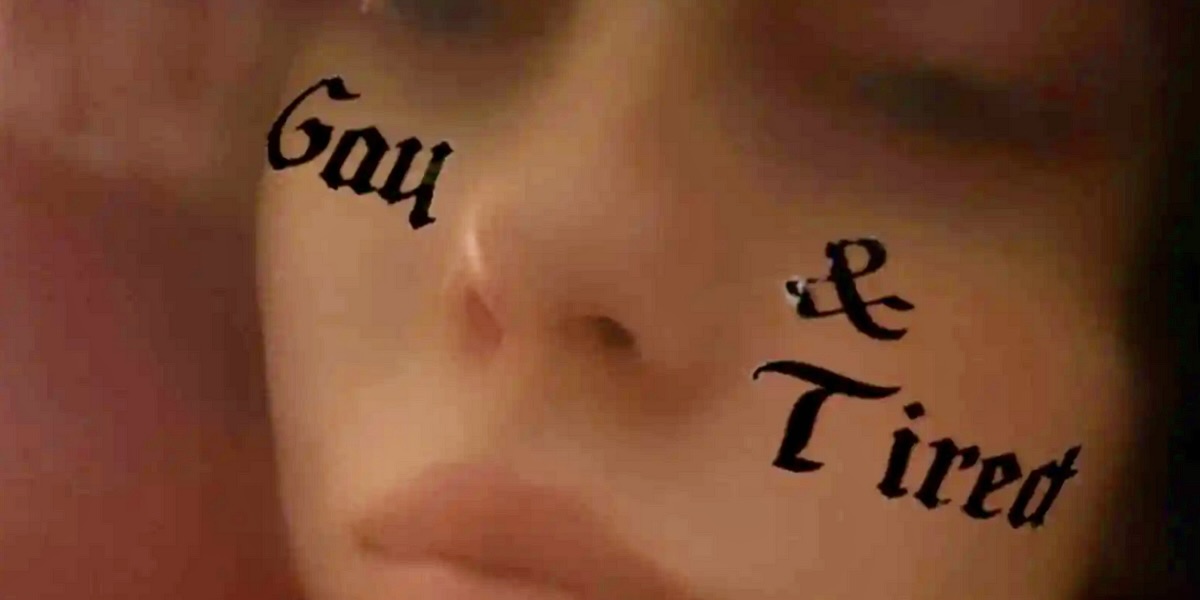Feature image of Billie Eilish and Janelle Monáe by Michael Kovac via Getty Images.

Photo of Billie Eilish via Billie’s Instagram
Over the weekend, Billie Eilish posted a selfie on Instagram using my personal favorite filter: gay & tired. For the unfamiliar, the filter slaps the word “gay” on one cheek and “& tired” on the other. Very to the point. Very relatable. Well Pink News is on the case, suggesting the filter could be a “hint” about Eilish’s sexuality and rounding up some of the enthusiastic responses from queer fans. Now, I don’t love the language of “hints” and “clues” when it comes to anyone’s sexuality (though it seems to be a frequent Thing when it comes to more than one ultra-famous white pop star!). Queer people aren’t puzzleboxes to be solved. And besides, Billie has been so cheeky about some of her references to queerness on social media that it’s giving the “I’m dropping hints” Kardashian meme — in other words, it doesn’t read as all that subtle to moi.
I like what this fan in particular had to say:
also queer people don’t owe you a full blown coming out. let us post our little fruity insta stories in peace
— L (@phoezrabridgers) November 10, 2023
It’s true! Celebrities don’t owe anyone clear labels or coming out moments. No one does! It seems absurd that we should demand a 21-year-old come out as queer. But to me, it is just as absurd to demand a 21-year-old say she’s straight, too. Eilish has, in the past, seemingly felt pressure to iterate her sexuality and has said she’s “very, very straight” on TikTok. But it’s hard to know how genuine this is, and it also still feels unfair, especially because she’s likely responding to accusations of queerbaiting in her music videos. And as our editor in chief Carmen Phillips wrote the last time we covered the Billie Beat:
“…it’s always worth repeating that the internet loves to get queerbaiting wrong. A word that was designed to critique writing choices on television somehow began being used to describe how individual people live their actual lives — and the discourse around that can be stifling. It can force people into coming out before they’re ready, which is what happened with Heartstopper’s Kit Connor, and that’s never OK!”
In a recent interview with Variety, Eilish offered an even more vulnerable nod toward her desires, saying:
She hasn’t always been a girl’s girl. In fact, she’s spent much of her life plagued by the assumption that other women don’t like her. “I’ve never really felt like I could relate to girls very well,” Eilish says. “I love them so much. I love them as people. I’m attracted to them as people. I’m attracted to them for real.”
She doesn’t miss a beat as she says this, like any other young woman of her generation talking about her life. For a stadium-selling artist from a different era, such a revelation would have required record-label ruminations about the effect it could have on her career. “I have deep connections with women in my life, the friends in my life, the family in my life,” she says. “I’m physically attracted to them. But I’m also so intimidated by them and their beauty and their presence.”
It’s clear from that interview that Eilish is parsing through all this and plainly stating her attractions in a way that doesn’t bend to our typical ideas of a “coming out” narrative.
Meanwhile, I’m here writing this silly little post about a silly little moment on social media even though I don’t entirely buy into the premise the post is built on. But I’m genuinely interested in considering and dissecting the politics of coming out, especially when it comes to famous people, and I think these are moments where we can complicate the conversation. Sexuality and gender aren’t as simple and as easy to package as a pop song. People love to sexuality is fluid but then expect celebrities to have easy to discern, legible, and even fixed sexualities. And I do think a lot of it has to do with just how much we’ve lost the plot on the term queerbaiting.
I am no celebrity, but I remember I was using a lot of gay terms and images on my tumblr long before I was out to even myself. In retrospect, yeah, those looked like super obvious hints at my own sexuality, but I wasn’t posting them to be “hints,” because again, we’re not puzzleboxes. I was moreso engaging in a form of queer expression that felt accessible to me without even knowing I was queer.
I understand the appeal for fans to latch onto these moments. Hell, I love a good social media investiGAYtion. But I think we can also hold some of these nuances in mind when talking about these things.
But what do I know! I am simply gay & tired.



She has flat out said she’s attracted to women in this new interview with Variety, so I feel like the case is closed and we can all stop circulating a clip from when she was 16 😅 people change! welcome, Billie. happy to have ya and your silly little gay insta stories.
https://variety.com/2023/music/features/billie-eilish-body-shamers-sexualized-barbie-oscar-buzz-1235787860/
Congratulations on number 700, Kayla Kumari Upadhyaya <3
being attracted to and intimidated by women feels pretty fucking gay to me. so welcome to the gay & tired club kid+++5
Right?!
This comment has been removed as it is in violation of Autostraddle’s Comment Policy. Repeat or egregious offenders will be banned.
Are these comments moderated or are we just letting people come on here and spew hate though? See above
Are these comments moderated or?